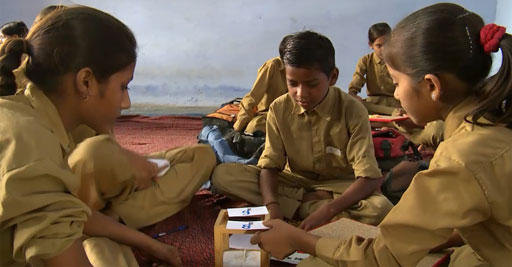3 What change should you lead?
You will now start to focus on one of the issues from your audit to bring about one improvement in teaching and learning your school. It is important not to try to improve too much at a time. By focusing on one issue, at once, you are more likely to succeed.
Activity 3: Identifying your focus for improvement
Using your responses in Resource 1 and the list of participatory principles of practice in the TESS-India key resources (Resource 3), identify a single focus for change. (For example, this might be ‘pair work’ or ‘questioning’.)
You can see from the table in Resource 3 which TESS-India OERs and videos are linked to each principle of practice so that you can connect with all the relevant TESS-India resources. Make a list of the TESS-India OERs (in Language and Literacy, Elementary Maths, Elementary English, and Elementary Science) that you could use to help you develop this approach to teaching in your school.

For example, you might know that your teachers do not think sufficiently about their lessons before class and therefore you choose to focus on planning lessons. This could lead to improvements not only in the way that lessons are structured, but also the variety of teaching methods and resources used. Alternatively, you might want students to talk more (see the key resource ‘Talk for learning [Tip: hold Ctrl and click a link to open it in a new tab. (Hide tip)] ’), or you might have big classes in your school and may decide that getting students to work in pairs (‘Using pair work’) helps teachers to teach large classes more effectively.
You can learn more about leading change in the OERs Planning and leading change in your school and Implementing change in your school.
It is important to choose a single focus in this term. If you try to change too much at once, the change will be less effective. Read the case study below to see how one school leader decided on her single focus.
Case Study 1: Mrs Chadha reflects on her findings
This is a Learning Diary entry written by Mrs Chadha, an elementary school leader who tried Activities 1 and 3 in her school.
I started filling in the table [in Resource 1] and it made me examine how I find out about what teaching is actually going on in the school. I realised that the information often comes from what teachers tell me during breaks, or from informal discussions. It made me think about perceptions: are the perceptions of the teachers the same as mine, or even the students?
I found that the key resources encouraged me to find a single focus for this term, as there seemed to be so much I didn’t know and so much to do. I believe that students asking questions helps their learning and I decided to go for a walk around the school to learn what questioning is going on in the lessons. Walking around the corridors during lesson time, it is easy to hear what is going on, as the doors are not closed due to the heat. I decided not to go into the classrooms, because I was concerned that the students and the teachers are not (yet) used to me doing that – the school leader entering could change what normally would happen in the classroom. So I listened from outside the classrooms.
What I noticed was that in most classes, the teacher was talking and the students listened silently. There was the occasional question from the teacher and the students chanted out the response together. But there were no open questions, or questions where students could disagree with what was said. The students were sitting in rows, all facing the board where the teacher was talking.
Only Mr Meganathan’s class was different – I heard him asking students a question where they had to disagree with him and explain their arguments. He also gave them ‘thinking time’ before they answered. I could hear students talking to each other about the questions and, looking through the window, I saw that they had turned to each other and were working in pairs.
It was clear that good practice was going on in Mr Meganathan’s classroom, but I knew I needed to be careful not to cause any resentment from other teachers if I publically singled him out for praise. I decided that I would make ‘questioning’ the focus for this term so that I could draw upon examples of Mr Meganathan’s participatory approach as well the TESS-India resources.
2 What is in the TESS-India OERs?
